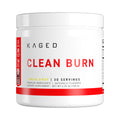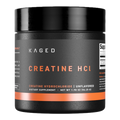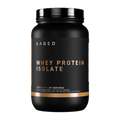Yes, we use sucralose in Kaged supplements, an artificial sweetener you’ve probably seen listed on other performance products, protein powders, and energy drinks.
We use sucralose, combined with natural stevia because it provides a sweet taste with no calories. This helps our supplements taste great and makes it easier to stick to your routine.
In this article, we’ll look at the research on sucralose, sugar, and other artificial sweeteners.
Sucralose (sold as Splenda®) is about 600 times sweeter than sugar.
It dissolves well, stays stable in powders and drinks, and blends nicely with natural sweeteners like stevia for a clean taste.
Importantly, sucralose has a long safety record.
The FDA approved sucralose in 1998 (for certain foods) and 1999 (for general use) after reviewing over 110 toxicology and clinical studies.
Yes, there are some downsides, which we will outline. But the subtle risks from high doses of sucralose are less to worry about than the high, known risks of sugar.
TL;DR — Why We Use Sucralose
-
Sweet taste, no sugar: A pinch of sucralose gives the sweetness of table sugar at essentially zero calories.
-
You’ll look forward to your supplements: Making supplements taste good helps you use them consistently. This is key to getting results.
-
Blended with stevia: We often mix sucralose with stevia. This lets us use less sucralose while masking any aftertaste. Sweetener blends can mimic sugar’s taste and reduce off-flavors.
-
Trusted safety: Global agencies (FDA, EFSA, etc.) have repeatedly reviewed sucralose. For example, a 2017 critical review concluded that decades of evidence “demonstrate[s] the safety of sucralose for its intended use.”
Sucralose Has Decades of Research and Safe Use
Sucralose is one of the most extensively studied sweeteners.
The FDA set an Acceptable Daily Intake (ADI) of 5 mg per kg body weight. For a 150-lb (68 kg) person, that translates to about 340 mg per day. One Splenda packet contains only about 12 mg of sucralose.
In fact, a 150-lb person would have to consume on the order of 30 Splenda packets in one day to reach the ADI.
In practical terms, drinking a typical sucralose-sweetened beverage or using the amount in a scoop of protein powder leaves you far below that limit. We also blend in stevia, so the sucralose dose per serving is lower.
The Concerns With Sucralose (and Any Non-Sugar Sweetener)
Every sweetener will have downsides. The presence of any sweet taste will have biological effects, whether it has calories or not.
Let’s be frank about what this research says, especially with regard to metabolic or microbiome changes with high sucralose intake, which are the common concerns.
Insulin Sensitivity
A few small human trials have found that sucralose can affect insulin and blood sugar under certain conditions. For example, in one randomized trial, healthy adults taking sucralose daily (about 15% of the ADI) for 14 days showed a significant drop in insulin sensitivity.
Another study found that drinking sucralose-sweetened soda with carbohydrates (like usual diet soda + a sweet snack) for 10 days impaired insulin sensitivity compared to a sucralose drink alone.
In other words, the combination of sucralose and carbs seemed to blunt how well their bodies handled sugar.
However, taking sucralose without added carbs didn't show the effect.
For most people at typical intakes, common sources note that glycemic impact is minimal. Sucralose itself has a glycemic index of zero.
In part due to its sweet taste, sucralose will signal an increase in insulin. However, this pales in comparison to the insulin increase from sugar, which has well-established serious health effects.
Blood Sugar & Inflammation
One pilot study reported that healthy young adults consuming a daily sucralose dose (equivalent to a 500 mL “light” soda) showed slight increases in markers of inflammation, blood glucose, and insulin compared to water.
Some other short-term studies in rodents have suggested that sucralose might raise inflammatory signals or even body weight in certain disease models, but animal results don’t always translate to people.
Sucralose might tweak metabolism in some settings, but no one should panic based on the current evidence.
Gut Microbiome
Many of the bigger concerns around sucralose come from animal studies. That same study on rats showed that very high sucralose doses have been linked to changes in gut bacteria and markers of gut inflammation.
In humans, one small 10-week trial in healthy volunteers found that sucralose consumption increased the abundance of Blautia coccoides and decreased Lactobacillus acidophilus compared to control drinkers.
These shifts were subtle, and the health implications are not yet clear. There’s also interesting (but preliminary) data suggesting sucralose might affect maternal gut bacteria and even the microbes in breast milk.
This study grabbed a lot of headlines, and if you’re pregnant, we would definitely recommend you talk to your doctor if you’re consuming sucralose regularly.
We don’t dismiss these findings. However, once again, this preliminary data is far less concerning than the crystal clear research on problems with sugar.
Cancer Risk
This comes up a lot in conversations about sweeteners. The best data on humans right do not show sucralose causing cancer. For example, a large French cohort study (over 100,000 adults) found that higher intake of artificial sweeteners was modestly associated with cancer risk, but that signal was almost entirely driven by aspartame and acesulfame-K – not sucralose.
In that study, people who consumed a lot of sucralose-containing products did not have a statistically significant increase in cancer.
Importantly, observational studies like these can’t prove cause and effect (people who avoid sugar often already have health issues that could bias results), and researchers themselves call for caution in interpretation. In any case, the major health agencies (FDA, EFSA, WHO, etc.) still regard sucralose as not carcinogenic at real-world doses.
The old scary headlines about Splenda causing tumors were based on rodent tests at astronomically high doses. Rats metabolize sucralose differently. Decades of later research never confirmed a cancer risk in people.
Everything Is a Risk–Reward Balance
The main alternative to sucralose is good old table sugar (or high-fructose corn syrup).
And there’s no question: chronic sugar intake has well-established health risks.
Excess added sugar promotes fatty liver, dyslipidemia, insulin resistance, high uric acid, type 2 diabetes, and cardiovascular disease. In simple terms, too much sugar drives obesity and metabolic issues.
By contrast, sucralose has no calories or carbs of its own, does not raise blood glucose directly, and does not feed fat metabolism the same way.
From a health standpoint, replacing sugar with a zero-calorie sweetener looks favorable
Finally, remember why people take supplements in the first place: for specific health or fitness benefits that can be hard to get otherwise.
A modest dose of sucralose in a protein shake or pre-workout is a small trade-off for those benefits.
 For example, protein supplements are strongly linked to preserving muscle mass, especially as we age. Losing muscle (sarcopenia) leads to frailty, falls, and metabolic problems. Getting enough high-quality protein is one of the best ways to combat that. Protein powders help people hit those targets.
For example, protein supplements are strongly linked to preserving muscle mass, especially as we age. Losing muscle (sarcopenia) leads to frailty, falls, and metabolic problems. Getting enough high-quality protein is one of the best ways to combat that. Protein powders help people hit those targets.
Likewise, evidence-backed pre-workout formulas (with ingredients like L-citrulline and CarnoSyn® Beta-alanine) can boost performance, allowing you to train harder and recover better.
The scientific consensus is that these ingredients do what they claim (improve blood flow, buffer acid, etc.).
So, sucralose’s risks are mostly theoretical and small at normal doses, while the risks of not taking these supplements (or taking them with sugar instead) are much larger. If a scoop of a Kaged supplement with sucralose and stevia helps someone stay fit and healthy, we view that as a big net positive.
We Will Continue to Use Sucralose Where Appropriate
We believe that, combined with stevia, it’s the safest, most effective way to sweeten our products without sugar and make our products taste amazing.
All current evidence, including decades of research and real-world use, says that when you consume sucralose within normal dietary amounts (far below the FDA’s ADI), there’s little to worry about for healthy individuals.
We’ll keep monitoring the science (and adjusting if new high-quality data emerges), but for now we stand by sucralose as a smart choice for our supplements.
*These statements have not been evaluated by the FDA. This product is not intended to diagnose, treat, cure, or prevent any disease.



























 For example, protein supplements are strongly linked to preserving muscle mass, especially as we age. Losing muscle (sarcopenia) leads to frailty, falls, and metabolic problems. Getting enough high-quality protein is one of the best ways to combat that. Protein powders help people hit those targets.
For example, protein supplements are strongly linked to preserving muscle mass, especially as we age. Losing muscle (sarcopenia) leads to frailty, falls, and metabolic problems. Getting enough high-quality protein is one of the best ways to combat that. Protein powders help people hit those targets.




